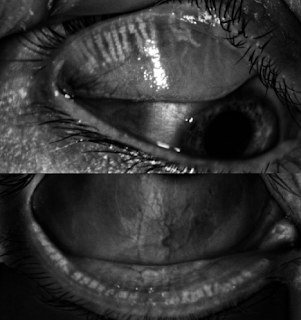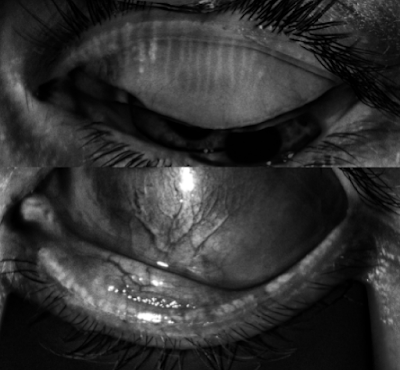Cell Phone and Computer Use Destroys Meibomian Glands and Leads to Chronic Eye Pain from Chronic Dry Eye
This is a very bold statement and should likely state “Excessive Cell Phone and Computer Use Destroys Meibomian Glands in Some People and Leads to Chronic Eye Pain from Chronic Dry Eye in Some People.”
The issue is that I and many other eyeMDs are seeing younger and younger patients with debilitating, chronic eye pain from chronic dry eye and absent meibomian glands.
This morning I saw 2 very young patients with terrible Meibomian Gland Disease. Their glands were almost completely gone.
The first is 32 years old, does not have any other medical problems. He has no dry mouth, no arthtiris and likely does not have Sjogren’s syndrome (though the SJO test is pending because of his LipiScan below.
Keep in mind, that normal Meibomian glands look like this photo below on the left: white piano keys filled with oil. As you move to the right, you can see these precious glands disappearing.
Now look at this 32 year old. He started spending time on the computer when he was in the 5th grade. He is not a computer programmer but spends about 5-7 hrs a day on the computer and “smart” phone.
The below is his right eye. He has some Meibomian glands left in the right upper lid and only little stumps left in the right lower lid.
The left eye below is worse: he has almost nothing left in the left upper lid and lower lid.
This explains why he feels his eyes all the time. He is too young to suffer from Chronic Eye Pain!
The other patient I saw this morning is similar, she is in her young 30’s with few meibomian glands left and chronic eye pain.
This is an international travesty!
What can be done?
Luckily, one of my patients is politically aware of how to make this known to the international community.
My issue is that elementary school children and parents are not aware of this devastating potential issue when they give a child a cell phone or computer. Computers are inherently addictive and inherently decrease a child’s blinking rate and “look in the distance” rate. This in turn lead to chronic, periodic dryness, inflammation, which I think destroys Meibomian Glands. Excessive near work also increase the risk of Myopia which increases the risk of Glaucoma, Cataract, Retinal Detachment (PVD, holes, tears, etc as discussed in a previous post.) https://drcremers.com/2017/03/dangers-of-excessive-near-work-dangers.html
What can we do exactly?
1. I believe we should not allow computers and cell phones in schools unless students are learning to computer program as high school students. Until very recently, most schools did not have computers or cell phones in the classrooms.
2. If computers are needed, there should be automatic programs that BLINK in Large letters, “BLINK and Look Away”every couple of minutes. Less helpful but better than what is happening now: have large monitors far away so student are more likely to look away and blink because of peripheral distractions.
3. The American Academy of Pediatrics and the AAO should be strong on this issue and publicly declare this as a health emergency and recommend parents do not not put their kids in front of the tv, computer, iphone more than 1hr per day after the age of 7 or later. The less the better with electronics from the eye point of view.
4. If you love your child, and do not want them to have a lifetime of chronic pain, do NOT give them a “smart” phone, nor their own computer, nor their own tv if they are living at home. Do not let these devices in their bedroom ever. If they need a cell phone, give them a dumb phone. Or take the internet browser & apps on the phone and just use the phone to make phone calls or use google maps. The last thing you want is your child surfing the internet because they are curious. I tell young students who come to me as patients, to not waste their eyes. If they are doing research on a cure for cancer or trying to save the world, then, go ahead & use the computer responsibly: but look away often, blink about 40-50x per minute, blink hard once every 5-10 minutes (or more often if you have dry eye syndrome) and try to do as much of your work as possible in notebooks. Working with a book or notebook can also cause myopia, chronic meibomian gland loss, but it is less common than chronic computer use. The reason, we think, is because turning a page of a book forces your pupil to change shape and changes the accommodation of the eye. I think this then decrease the stimulus for myopia. Also turning the page usually makes one blink.
Sandra Lora Cremers, MD, FACS




